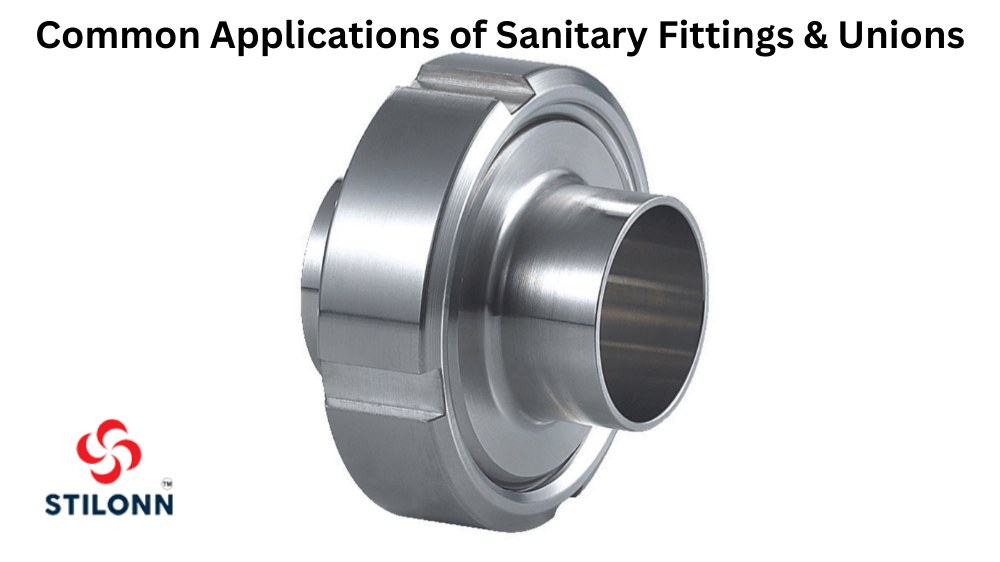Sanitary Fittings and Unions are essential components in food and beverage, pharmaceuticals, and other industries where the processing or handling of sensitive products requires a high degree of hygiene. These fittings and unions play a crucial role in ensuring the safety and quality of products, preventing contamination, and facilitating efficient processes. In this blog post, we will explore some of the common applications of Sanitary Fittings and Unions and how they contribute to the success of various industries.
What are Sanitary Fittings and Unions?
Sanitary Fittings and unions are special pipe fittings used to create a safe and hygienic environment in industrial piping systems. They typically have smooth surfaces to help prevent contamination and bacteria from forming inside the pipes and easy-to-clean connection points that allow quick cleaning without removing the fitting. Sanitary Fittings and unions also have unique designs with tight seals that help reduce leak points, keep particles out of sensitive environments, and provide superior air tightness. Depending on their intended use, they can be made from various materials, such as stainless steel or plastic.
Applications of Sanitary Fittings & Unions
Food and Beverage Industry
The food and beverage industry is one of the largest and most diverse industries that rely heavily on sanitary fittings and unions. These components contribute to the hygiene standards required in food and beverage processing and ensure that the products produced meet the regulatory requirements for quality and safety. Some of the typical sanitary fittings and unions used in this industry include butterfly valves, quick-connect couplings, and tri-clover fittings. These fittings and unions are made of materials that can withstand high temperatures and pressures, and they come in various sizes to accommodate different process requirements.
Pharmaceuticals Industry
In the pharmaceutical industry, sanitary fittings and unions prevent contamination and ensure that the products meet the stringent purity and efficacy requirements. These fittings and unions are crucial in the processing, handling, and packaging of drugs, biologics, and vaccines. They help maintain the process’s sterility by providing leak-proof joints, easy assembly and disassembly, and compatibility with various process fluids. Some sanitary fittings and unions commonly used in the pharmaceutical industry include aseptic valves, sanitary tubing, and hygienic unions.
Chemical Industry
The chemicals industry is another major user of sanitary fittings and unions. Using these components in the chemical industry is essential to maintain the safety of workers and prevent environmental contamination. Sanitary fittings and unions used in the chemicals industry are made of materials resistant to chemicals and corrosive substances. They are designed to handle aggressive chemicals and toxic substances and are used in various applications, such as acids, alkalis, solvents, and hazardous materials.
Biotechnology Industry
The biotechnology industry relies heavily on sanitary fittings and unions to maintain the sterility and purity of its processes. These components are essential in bioprocessing applications, such as fermentation, cell culture, chromatography, and filtration. Sanitary fittings and unions used in the biotechnology industry are designed to withstand high temperatures, pressures, and corrosive substances used in these applications. They are also designed to facilitate fast and easy assembly and disassembly to minimize downtime during maintenance and cleaning.
Water Treatment Industry
The water treatment industry is another sector that relies on sanitary fittings and unions to ensure the safety and quality of drinking water. Sanitary fittings and unions used in the water treatment industry are designed to handle a variety of fluids, such as chlorine, ozone, and ultraviolet radiation. These components are essential in the treatment process and help to prevent contamination and ensure that the water meets the regulatory requirements for purity and safety.
Conclusion:
In conclusion, sanitary fittings and unions are essential in various industries, such as food and beverage, pharmaceuticals, chemicals, biotechnology, and water treatment. These components play a crucial role in ensuring the safety and quality of products, preventing contamination, and facilitating efficient processes. Using high-quality sanitary fittings and unions is essential for compliance with regulatory requirements and maintaining the sterility and purity of processes. As such, industries must invest in high-quality products and work with experienced suppliers to ensure their processes are efficient, safe, and compliant with regulatory requirements.




